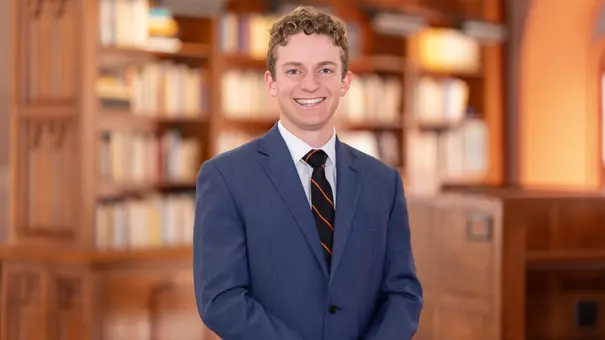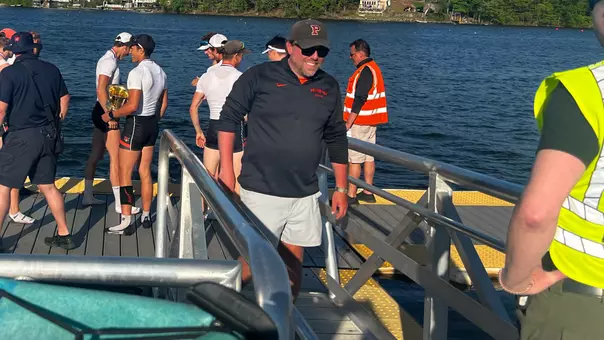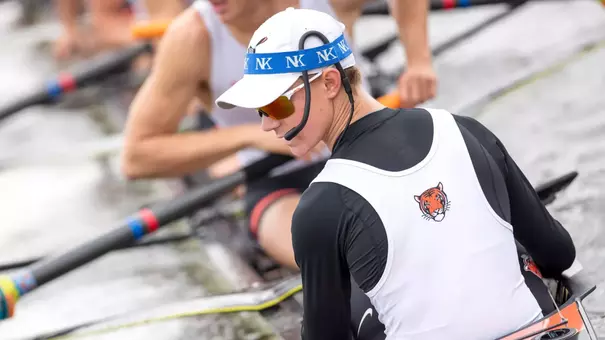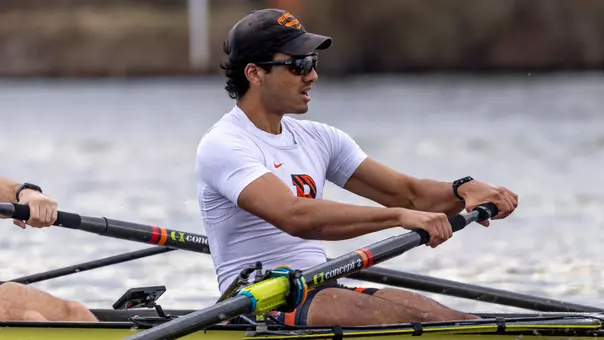Princeton University Athletics
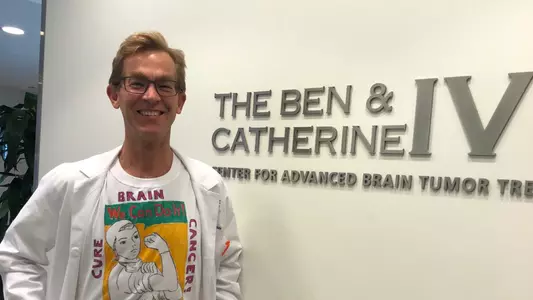
Rowing Celebration Feature: Charles Cobbs ’85
February 28, 2022 | Heavyweight Rowing, Men's Rowing - Lightweight
The words had barely traveled the distance from Charles Cobbs’ mouth to his ears when he realized what he had just said and how it sounded.
“You can lose your mind in it,” he said first.
He was talking about what he likes about his job. As he heard what he said, he quickly tried to recall those words and replace them with different ones.
“Well, maybe not lose your mind,” he said laughing. “That doesn’t sound quite right.”
Given that his job is that of a neurosurgeon, it was clear that maybe, just maybe, there was a better way to put it. And so he did.
“You can get into a zone,” he says. “You almost lose your awareness of what’s around you.”
Now that he’s going down the right path, he continues.
“It’s a lot like sports,” he says.
It most definitely sounds like the sport that has been the biggest part of Cobbs’ life, rowing. An alum of the Princeton men’s lightweight program from the Class of 1985, Cobbs went from never having been in a boat to never losing a race during his time as a Tiger rower. His career ended with the 1985 Eastern Sprints and IRA National Championships.
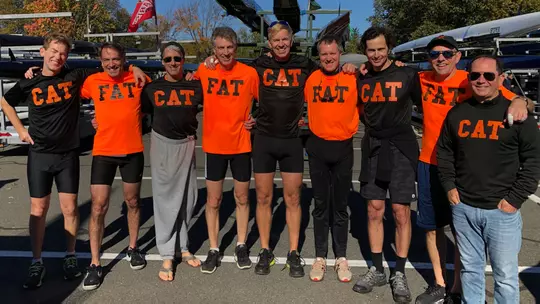
In rowing, he found a sport that in some ways mirrors what his career would become. They’re both physical. They both require stamina. Technique is of the utmost importance. As he goes to describe what he does in an operating room, neurosurgery, like rowing, is “a thinking specialty.”
It’s early in the morning in Western Canada as he speaks. He is in British Columbia, not far from his home in Seattle and pretty far from his roots in Alabama. He’s a regular skier, and among those he’s skied with include current Princeton heavyweight men’s coach Greg Hughes.
He grew up in Birmingham, which is not known for either rowing or skiing. It is known for Alabama football. He grew up a Crimson Tide fan, and his own athletic career consisted of some baseball and a great deal of track and cross country.
He applied to Princeton and was accepted, and his plan was to walk onto the track and field team, something that didn’t materialize after an ankle injury just before his freshman year began.
“I was moping around and went past Dillon Gym,” he says. “They had a shell out front. Ed Kloman was the freshman coach then. I asked him what it was, and he said it was crew and that I should try it. So I tried out. I had a ball with freshman rowing.”
That was his introduction to the sport. His rise was meteoric.
“I had the benefit of a distance runner who had the VO2 max training from running,” he says. “When fall rowing started my freshman year, I had the endurance part under my belt. I learned that I had some talent at least.”
After winning the Eastern Sprints as a freshman, he was elevated to the varsity lightweight boat as a sophomore. That year also ended with an Eastern Sprints championship and this time a trip to Henley.
That summer, which was 1983, he had his introduction to the national lightweight team program, when he made the U.S. team as an alternate.
“I couldn’t believe it,” he says. “I’d gone from an introduction to the sport to hanging out with the national team program in such a short time. It was amazing. Being a spare on the team, though, was brutal. You do all the workouts. You just don’t get to compete.”
Cobbs would travel to Germany with the U.S. team, but he would not, as he said, compete. The experience left him with a bit of a bad taste.
“The national team experience was not like the Princeton experience,” he says. “This wasn’t the same as rowing with your buddies. It was a super competitive cutthroat environment. They were competing against you, not with you. I had to get that out of my system, but when I came back to Princeton, I was pretty fried. I did the fall, but I decided I needed to take the spring off. I’d been rowing non-stop around the calendar and needed a break. I also thought I’d focus on my premed studies, but of course my grades got worse.”
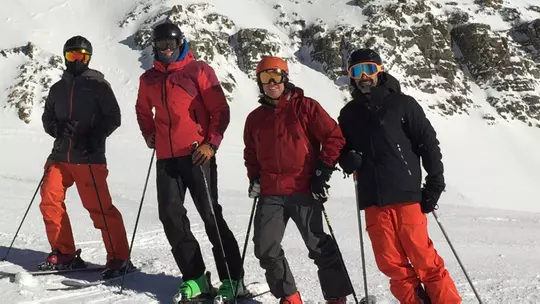
Without him, the 1984 lightweights had a good season but did not win the Eastern Sprints. He did what he knew he’d do all along, which is return to the team for his senior year. He was welcomed back enthusiastically.
His senior spring was of the more magical seasons the lightweights have had. Again Princeton would win the Eastern Sprints, and then the lightweights would row in the second varsity heavyweight race at the IRA championships – and win.
“We beat all those heavyweight teams,” he says. “We got their shirts. My son, who is bigger than I am, still wears some of them.”
The success his teams had can be traced directly to the man who led the, Gary Kilpatrick. He was tough on his rowers, but they were certainly ready come race day.
“He was a great coach,” Cobbs says. “He was funny, and he was tough as hell. He would work us until we looked at the other team and literally said ‘we’re going to crush these guys; there’s no way they’ve worked as hard as we have.’ My teammates were also just a phenomenal group of people. I couldn’t ask for a better group of people. The personal gift I got from Princeton Rowing was getting my butt kicked and learning to be tough while having an incredible group of friends from all that. They’re still some of my best friends.”
His rowing career did not end at graduation. He was, of all things, a Classics major at Princeton, with a thesis entitled “Love as an Intermediary in Plato, Philo, and the Gospel of Philip,” but his interest from when he was a kid was medicine.
He applied to medical school at Alabama and was accepted, and then he asked if he could defer for a year to try out again for the national team. When he was told there were no deferments, he said thanks but that he was still going to try out for the national team. Eventually, Alabama relented. He would make the U.S. boat and win bronze in the fours at the World Championships in Belgium.
“That was one of the best years of my life,” he says. “When I came back, I got a job working at the medical center. I found a research lab to work in, with two of the top scientists who had just discovered HIV. I worked in their lab and was motivation by doing research.”
He graduated from Alabama and then did his residency at the University of California San Francisco Medical Center.
“Because my coach at Princeton was so tough, I gained life lessons from rowing with him that, rightly or wrongly, made me feel invincible for other things. Hit me as hard as you want with residency. You can’t hurt me.”
He would actually manage to pull off a rare double while at UCSF – neurosurgical residency while also completing the Escape From Alcatraz triathlon. When lightweight rowing was added to the 1996 Olympics, he trained for that while a resident as well, getting up at 4 or 5 in the morning and doing two workouts a day. A bad cold prevented him from being at his best at the Trials, but he had managed to push through the rigorous training for both.
These days he is in Seattle, where he performs neurosurgery and also serves as the director of the Ben and Catherine Ivy Center for Advanced Brain Tumor Treatment. His work focuses on treatments and potential cures for various brain cancers.
It’s a tough profession, obviously. What was it like the first time he cut into someone’s brain?
“It evolves slowly, of course,” he says. “I was a resident at one of the top places in the world. It was pretty intimidating. The very first time one of the surgeons said ‘make the incision and keep going and I’ll come back.’ It was sink or swim.”
He’s smiling at the memory though.
“The poor patient,” he says laughing.
And now? What’s it like now?
“It’s fascinating,” he says. “Every time.”
He doesn’t actually lose his mind when he does it. What he does do is bring what he learned in medical school and residency with him – and what he learned as Princeton lightweight rower. It’s a combination that has served him, and his patients, very well.
— by Jerry Price







